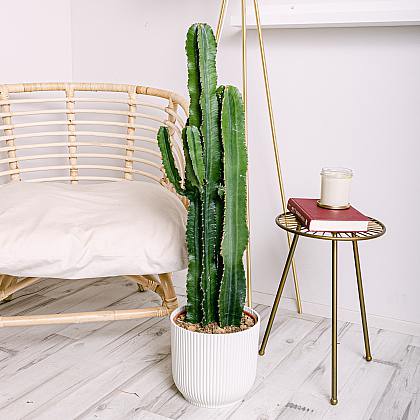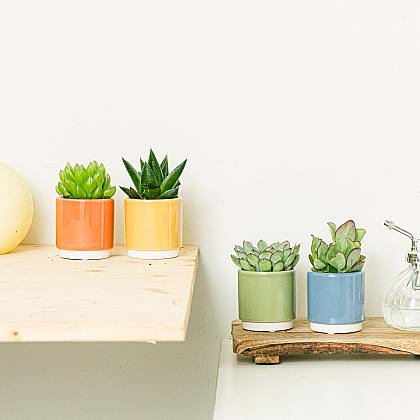Learn how aloe vera purifies the air in your home in an incredible way
Aloe vera, also known as aloe vera, is a plant that has been valued for centuries for its many health and beauty benefits
Aloe vera, also known as aloe vera, is a plant that has been valued for centuries for its many health and beauty benefits. However, its properties are not limited only to these areas, as aloe vera also has the ability to purify the air in our home in a surprising way. In this article, we'll discover how this miracle plant can help us improve the quality of the air we breathe in our indoor spaces. We will learn about the benefits of aloe vera at home, how to grow and care for it properly, as well as some tips for using it as an air purifier in different areas of our home. Prepare to be amazed by the purifying powers of aloe vera!
The power of aloe vera to clean the air
Aloe vera is a plant known for its many medicinal and cosmetic properties, but it is also a great ally to purify the air in our home. This plant is able to absorb toxins and environmental pollutants found in the air, thanks to its gel-filled leaves. Aloe vera is able to filter substances such as benzene, formaldehyde and trichloroethylene, which are present in cleaning products, paints and plastics. In addition, it also helps to reduce the humidity of the environment, which prevents the proliferation of bacteria and fungi.
To get the benefits of aloe vera as an air purifier, you need to have one or more plants at home. It is recommended to place them in spaces where there is a higher concentration of chemicals, such as the kitchen or bathroom. It is also important to keep them in a place with good natural lighting and to water them regularly without overwatering them.
Aloe vera not only purifies the air, but also has a relaxing and refreshing effect thanks to its natural aroma. For this reason, it can be used as a natural aromatherapy in different spaces of the home. One option is to cut an aloe vera leaf and leave it in a bowl of water to release its aroma. Another option is to use products made with aloe vera extract, such as candles or diffusers.
In conclusion, aloe vera is an excellent option to purify the air in our home naturally and effectively. In addition, its use as aromatherapy can contribute to creating a more relaxing and cooling environment.
Surprising Benefits of Aloe Vera at Home
Aloe vera is a plant known for its amazing benefits in the home. In addition to being a natural air purifier, aloe vera also has antibacterial and antifungal properties, making it an ideal choice for maintaining a clean and healthy environment. This succulent plant has the ability to absorb toxins and environmental pollutants, such as formaldehyde and benzene, which are commonly found in cleaning products and building materials. By having aloe vera at home, you can enjoy purer air free of substances that are harmful to your health. In addition, aloe vera also helps fight allergies, as its gel contains anti-inflammatory compounds that can relieve symptoms such as nasal congestion and sneezing. Another advantage of aloe vera is its ability to increase air humidity, which is beneficial for people who suffer from dry skin or respiratory problems. To get the most out of aloe vera's benefits at home, it's important to grow and care for the plant properly. It requires indirect sunlight, moderate watering, and well-drained soil. Aloe vera gel can also be used for natural aromatherapy, creating a refreshing and relaxing experience at home. In short, aloe vera is a natural and effective solution for improving air quality in the home, fighting allergies, and creating a healthier environment.
How to Grow and Care for Aloe Vera at Home
Growing and caring for aloe vera at home is a simple task that can provide great health benefits. The first step is to choose a suitable location, preferably an area with indirect sunlight and good ventilation. The plant needs a well-drained substrate, so it is recommended to mix garden soil with coarse sand or perlite. Also, it's important not to overwater, as overwatering can rot your roots. You should wait until the soil is dry before watering again. In terms of temperature, aloe vera prefers warm climates and does not tolerate frost well.
To ensure healthy growth, it is important to fertilize the plant every two weeks during the growing season with a liquid organic fertilizer. The lower leaves can also be pruned when they turn brown or yellow to encourage the growth of new leaves.
It is important to note that aloe vera is a hardy plant and can survive in adverse conditions, but proper care can improve its health and provide greater health benefits. In addition, by growing aloe vera at home, you have the advantage of being able to use its air-purifying properties at home consistently and naturally. With these simple tips, anyone can grow and care for aloe vera at home to enjoy its many benefits.
Natural Aromatherapy with Aloe Vera: A Refreshing Experience
Natural aromatherapy with aloe vera is a refreshing experience that can transform the ambiance of your home. Aloe vera is not only known for its air-purifying properties, but also for its fresh and relaxing fragrance. By using aloe vera as part of aromatherapy, you can enjoy the therapeutic benefits that this plant offers. To use aloe vera as a flavoring, simply cut a fresh leaf from the plant and extract the gel. Then, place the gel in an aromatherapy diffuser or bowl of hot water to release its refreshing scent. In addition to providing a pleasant scent, aloe vera aromatherapy can also help improve mood, reduce stress, and promote relaxation. This refreshing experience will not only transform the ambiance of your home, but also give you a sense of well-being and peace of mind. Try natural aromatherapy with aloe vera and find out how it can improve your quality of life.
Aloe vera as a purifier of toxins and environmental pollutants
Aloe vera is known for its medicinal properties and benefits for the skin, but it also has great potential to purify the air in your home. Aloe vera can absorb common environmental toxins and pollutants, such as benzene and formaldehyde, found in cleaning products, paints, and other building materials. These chemicals can cause breathing problems, eye irritation, headaches, and other symptoms. However, aloe vera can help remove these pollutants from the air. The plant absorbs chemicals from the air and converts them into fresh, clean oxygen.
Studies have shown that aloe vera is one of the most effective plants for purifying indoor air. Plus, it's easy to care for and maintain at home. It is important to place the plant in a place where it will receive enough indirect sunlight and water it regularly. For best results, it is recommended to have several aloe vera plants in different rooms of the house.
In addition to purifying the air, aloe vera can also help fight allergy symptoms and improve overall air quality. The plant emits negative ions that can reduce the number of particles in the air and improve sleep quality. In short, aloe vera is a natural and effective solution to improve indoor air quality in your home.
Aloe vera: a natural solution to fight allergies and improve air quality
Aloe vera: a natural solution to fight allergies and improve air quality. Aloe vera is known for its numerous health and beauty benefits, but it can also be a natural solution to fight allergies and improve the air quality in our home. Aloe vera gel contains anti-inflammatory and antibacterial properties that help reduce the symptoms of respiratory allergies, such as nasal congestion and sneezing. In addition, this plant has the ability to purify the air by absorbing toxins and environmental pollutants. Aloe vera releases oxygen during the night, making it an ideal natural air purifier to place in the bedroom. It can also be used in other areas of the home, such as the living room or study, to improve air quality and create a healthier environment. To take full advantage of aloe vera's benefits as an air purifier, it's important to properly grow and care for this plant at home. It is recommended to place it in a sunny place and water it sparingly to avoid excess moisture. In short, aloe vera is not only a beautiful ornamental plant, but it can also be a natural solution to fight allergies and improve the air quality in our home.
Tips for using aloe vera as an air purifier in different spaces
There are different ways to use aloe vera as an air purifier in different spaces of our home. One option is to place several aloe vera plants in a room to take advantage of their purifying properties. It is recommended to have at least one plant per 10 square meters for optimal results. Another way to use aloe vera is to cut a leaf off the plant and extract the gel inside. This gel can be mixed with water and used as a natural spray to refresh and purify the air in any environment. Aloe vera gel can also be used to make homemade scented candles. For this, beeswax must be melted and mixed with aloe vera gel. The mixture is then poured into candle molds and allowed to cool. Not only will these candles provide a soft, soothing light, but they will also help purify the air in the space where they are. In addition, aloe vera gel can be combined with essential oils to create a natural air freshener. Simply mix a few drops of the essential oil of your choice with the aloe vera gel and place it in an open container in the room you want to scent. This way, you can enjoy a fresh and fragrant environment while taking advantage of the purifying properties of aloe vera.
Aloe vera is a plant with multiple benefits, including purifying the air in our home. Its ability to absorb toxins and environmental pollutants makes it a natural ally in improving the quality of the air we breathe. In addition, their care and cultivation are simple and accessible to all. Using aloe vera as an air purifier in different spaces can be an economical and healthy option to improve our quality of life. However, it is important to note that aloe vera is not a one-size-fits-all solution to environmental pollution and that we must continue to work on policies and actions that protect our planet. Let's reflect on how we can individually and collectively contribute to a cleaner, healthier world


